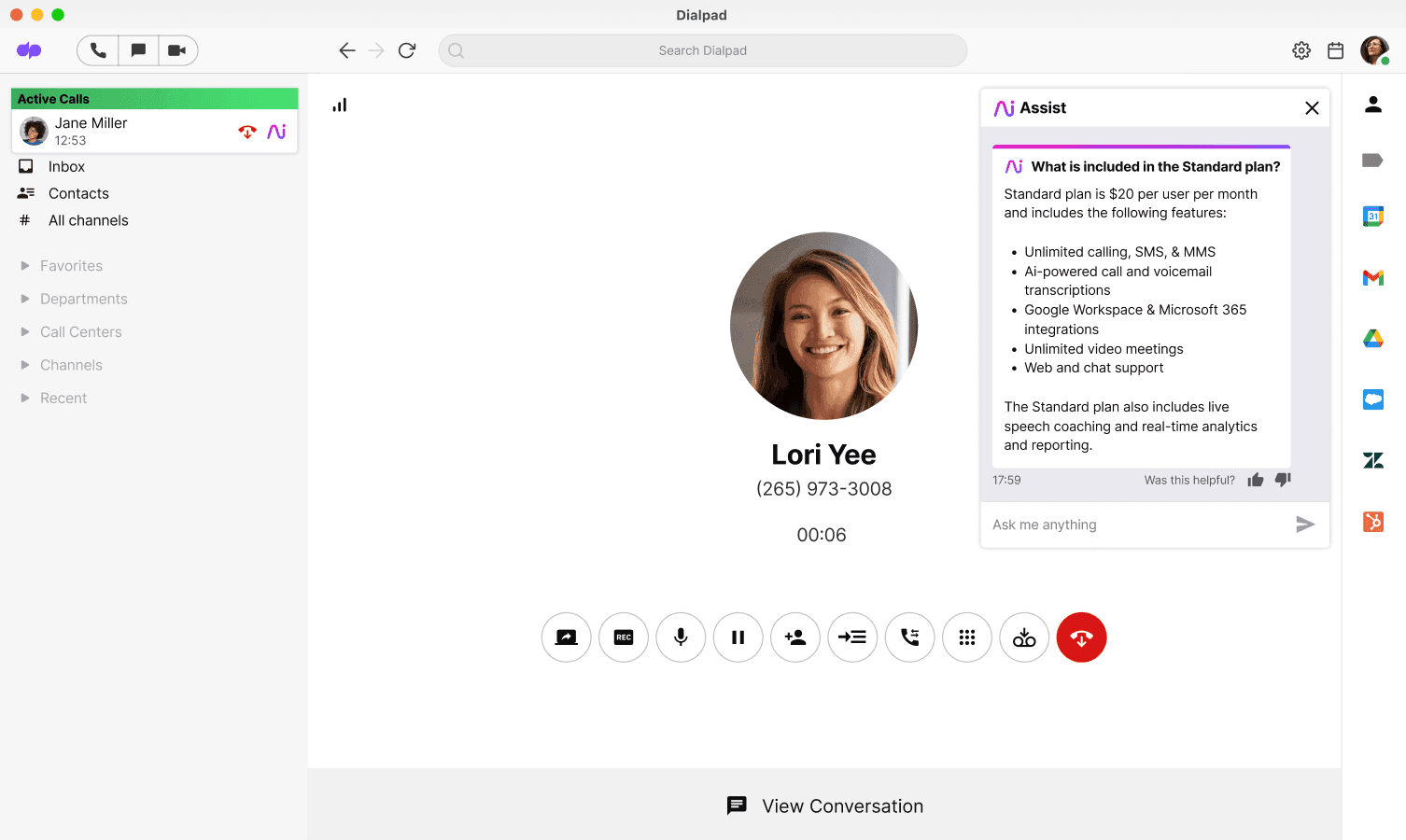What are AI virtual assistants and how can businesses use them?

Senior Product Marketing Manager - Ai Contact Center

Tags
Share
If you've ever used Siri or Alexa, then you've already experienced the power of an AI virtual assistant.
But did you know that businesses are now using AI virtual assistants to help with everything from providing better customer service to closing more sales?
In this blog post, we'll take a look at what AI virtual assistants are, how they work, and the benefits they offer businesses across different industries. We'll also take a behind-the-scenes look at the building blocks that make virtual assistants possible: conversational AI.
But first, let’s clarify what we mean by AI virtual assistants.
What is an AI virtual assistant?
An AI virtual assistant is a type of artificial intelligence (AI) tool that can understand and respond to verbal and/or written human questions and requests, and even do speech analytics. In a business context, they can commonly be used to perform tasks such as answering customer questions, scheduling appointments, and providing general information.
Virtual assistants that are built using NLP (Natural Language Processing) and other forms of artificial intelligence can “understand” complex questions and identify the right answer in a connected database, instantly serving up the best response. This greatly differs from traditional chatbots, which rely on a human being painstakingly mapping out every conceivable customer question with a static answer.
For example, a customer might ask the question, "What is your return policy?" If the question was phrased in a way that the chatbot manager didn’t plan for, the customer service chatbot wouldn’t be able to deliver a response. But, an AI virtual assistant leverages NLP technology to analyze the question and provide the correct answer—regardless of phrasing, or even spelling errors.
Some virtual assistants are also able to handle more complex tasks, such as scheduling appointments or managing customer data. This is possible because they can access and understand large amounts of data very quickly.
Virtual assistants can be very helpful for businesses, since they can free up employees' time by taking care of simple tasks that don’t really require human interaction, and also help to improve the customer experience by providing support around the clock, even when agents are offline.
Conversational AI: The building blocks of virtual assistant AI technology
A good AI virtual assistant solution has to be built on robust conversational AI and NLP (Natural Language Processing) technology.
This is what allows virtual assistants to understand and respond to questions in a natural-sounding way (as opposed to a robotic or stiff tone of voice).
If you’ve ever tried using ChatGPT or Bard, then you’ve already seen the natural-language responses that have so many people excited about using AI in their everyday lives.
💡 Super important:
Even though a virtual assistant might have great conversational AI supporting it, that still only means that it will be able to respond to questions or requests in a conversational way. That is, it’ll sound natural and maybe even friendly—but that is no guarantee that what it says is true or accurate. This will depend on the connected knowledge sources and data that the AI has access to, and the AI’s ability to understand that knowledge.
Conversational AI can help businesses in a number of ways, including providing quick and accurate answers to common customer questions, surfacing relevant information and data, and closing out interactions. In addition, conversational AI can help to improve the customer experience by providing quick and accurate answers to common questions. They can also help to identify patterns in customer queries, which can then be used to improve the overall customer experience.
Conversational AI is quickly becoming a staple across many businesses and industries, due to its many benefits. If you're not already using conversational AI in customer service or sales, you may be missing out on a valuable opportunity to improve your operations.
Examples of different types of AI virtual assistants
There are different types of AI virtual assistants, each with their own unique set of features and capabilities. Here are some examples of the most popular types of AI virtual assistants:
1. Customer service AI virtual assistants
These virtual assistants can do two things to support your customer service strategy—firstly, they can deflect inquiries that customer service teams receive by providing instant answers to customers’ questions.
These customer service AI assistants can also surface relevant information and data to help customers self-service, like setting up a move or opening an account:

The second way that some customer service AI virtual assistants work is by helping the agent—there are some solutions, like Dialpad Ai Live Coach, that automatically pops up helpful information and connects agents to the most relevant content and materials at the right time.
2. Sales AI virtual assistants
Similarly, this type of virtual assistant can do the same two things as customer service AI assistants.
You can set up a sales AI virtual assistant on your website’s checkout page to answer any questions that a customer might have before confirming their purchase (like shipping or delivery questions), and the Dialpad Ai Live Coach feature we mentioned above can provide information automatically for sales reps too:

3. Consumer AI virtual assistants
Finally, almost everyone has used this type of AI virtual assistant before. If you’ve ever asked Siri or Alexa to turn on the lights, or even what the weather was like today, you’ve already experienced what it’s like to use a consumer-focused AI virtual assistant.
The benefits of AI virtual assistants across industries
AI virtual assistants in healthcare
Using an Ai Virtual Assistant in fields like healthcare should be mandatory, because of the importance of delivering immediate, accurate answers for people with urgent, potentially life-threatening needs.
An Ai Virtual Assistant can apply to healthcare use cases in a number of ways. From the patient’s perspective, a sophisticated virtual assistant can be an entry point where you insert your medical information and issues in order to speed up the process with which nurses and doctors can triage you.
For example, if I’m connecting with a doctor through digital chat because I have a terrible cough and can’t use the phone, I can submit my information through the virtual assistant so that the nurse can start asking me questions about my actual symptoms.
Now, let’s look at it from the nurse’s perspective. They could take my listed symptoms and type them into the virtual assistant to access real-time guidance. Depending on the connected knowledge sources, the nurse could provide immediate instructions on what I should do to treat myself over the counter, if I should go into an office to see a doctor, where my closest emergency room is, and more.
The AI virtual assistant can take all the relevant information and speed up the interaction in a way that delivers more immediate and informative patient care.
AI virtual assistants in insurance
The same principle applies within the insurance industry, where customers may have very urgent and/or complex questions, which the insurance contact center’s agents need to answer quickly. Often, they’ll need to be able to quickly find highly nuanced or specific answers to answer questions around policies and regulations.
Let’s say I’m interested in purchasing a life insurance policy and want to know what the potential premiums would be. There are a number of factors that go into that answer—my age, relative health, profession, most of which would usually be discussed with an insurance agent.
Imagine if the agent had access to a sophisticated virtual assistant that could ingest that information and connect to a backend system that could calculate premiums instantly based on those answers—the system could provide a near-instant estimate that would ordinarily require a person much more time to calculate.
For insurance agents (and contact center agents) in general, the sheer number of variables and processes common in the insurance industry would be much easier to navigate with a virtual assistant that could instantly access all of that connected knowledge.
💡 Further reading:
Learn more about AI use cases in insurance.
AI virtual assistants in utilities
But what about something like utilities? There are many different ways in which AI virtual assistants can improve processes for both customers and agents too.
Let’s say you walk into your house and smell gas—this is potentially dangerous and requires immediate attention. If your utility provider had an AI virtual assistant, you’d be able to go to their website or another messaging channel like WhatsApp, and quickly enter your address and billing information (so that the system knows who you are) and let the AI virtual assistant know what the issue is.
(The AI assistant would likely tell you to leave your home immediately before escalating the issue to call the fire department or emergency services in the case of an actual gas leak.)
The contact center agent would also be able to use the virtual assistant to look up emergency procedures and processes easily to make sure your gas leak is handled efficiently and safely.
Ultimately, though, the issue can’t be handled without the field technician who is called out to your house, and let’s say they can’t find the gas shut-off valve.
If the field technician has access to an AI virtual assistant via a mobile app on their phone, they can ask if the database has any additional suggestions on where to find the shut-off valve or how to assess whether or not you have a legitimate gas leak.
These are just a few examples of industry-specific scenarios where help can be expedited automatically with the help of AI, to ensure a positive customer experience.
AI virtual assistants: An essential tool for forward-thinking businesses
As businesses increasingly rely on AI virtual assistants to provide quick and accurate answers to common questions, it's important to understand how they work and what they're capable of.
AI virtual assistants are essential for busy customer-facing teams because not only can they provide answers to customers in an automated and instant way, they can also help deflect calls and messages away from overworked agents—while ultimately improving the overall customer experience.
If you're not already using an AI virtual assistant in your business, you may be missing out on a valuable opportunity to improve your workflows and operations. See how a solution like Dialpad’s Ai-powered virtual assistant could work for your team!
Get a hands-on look at AI virtual assistants
Book a walkthrough of Dialpad Ai with our team, or take a self-guided interactive tour of the app first!
